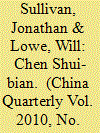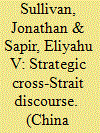| Srl | Item |
| 1 |
ID:
100501


|
|
|
|
|
| Publication |
2010.
|
| Summary/Abstract |
Chen Shui-bian achieved an international reputation for his promotion of Taiwan independence. Whilst that reputation may have been well earned, the analyses on which this conclusion is based are frequently flawed in two ways. First, by using an undifferentiated notion of independence, they tend to conflate sovereignty with less threatening expressions of Taiwanese identity and pro-democracy discourse. Second, by failing to take into account the impact of immediate strategic context, analysts ignore a fundamental element of democratic political communication. In our empirical analysis of more than 2,000 of Chen's speeches, we seek to avoid both flaws by unpacking the concept of independence and taking into account Chen's strategic relationship with his primary audiences. Our findings challenge popular portrayals of Chen, but more importantly they have strong implications for policy makers and students of political rhetoric with regard to current and future ROC presidents.
|
|
|
|
|
|
|
|
|
|
|
|
|
|
|
|
| 2 |
ID:
088461


|
|
|
|
|
| Publication |
2009.
|
| Summary/Abstract |
When Chen Shui-bian won the presidency in 2000 and the Democratic Progressive Party became the 'ruling party', many observers said Taiwan experienced democratic consolidation. Nevertheless Chen and his supporters continued to talk of democratization in the ensuing years. But political reform, advances in civil liberties, and ridding the system of corruption must be considered essential to that process. Reform failed due to the fact that Chen's party did not have a majority in the legislature and the president showed poor leadership. Civil liberties deteriorated owing to Chen playing ethnic politics as well as his administration's lack of respect for democratic values. The view that money ruled in politics and the prevalence of personal greed caused corruption to worsen. These three factors suggest the devolution of Taiwan's democracy during the Chen era rather than its consolidation and explain the new administration's loss of public support.
|
|
|
|
|
|
|
|
|
|
|
|
|
|
|
|
| 3 |
ID:
119216


|
|
|
|
|
| Publication |
2013.
|
| Summary/Abstract |
Republic of China presidents Chen Shuibian and Ma Yingjiu have espoused substantially varied positions at different times on cross-Strait relations. Given the prominence of the presidents' rhetoric in an otherwise relatively stable relationship, these discursive fluctuations have been a cause of consternation and curiosity for observers of the cross-Strait relationship. However, their behaviour is consistent with democratic politics in general (issues and policy stances evolve and emerge, and political actors must engage and appeal to a wide range of stakeholders with varied agendas) and in terms of the growing influence of distinct sectors (such as big business) within Taiwan. This article puts forward a method for analysing this variation across three presidential terms, namely Chen's first and second term and Ma's first term. How does the content of both presidents' public pronouncements develop over time? How does the content of their discourse vary according to the strategic context of the constituency they are addressing? What does this reveal about the strategy and strategic relationships behind presidential rhetoric in Taiwan? In addressing these questions, the article contributes a quantitative perspective to existing work on political discourse in Taiwan and to the growing methodological and applied literature on how to systematically analyse Chinese political text.
|
|
|
|
|
|
|
|
|
|
|
|
|
|
|
|